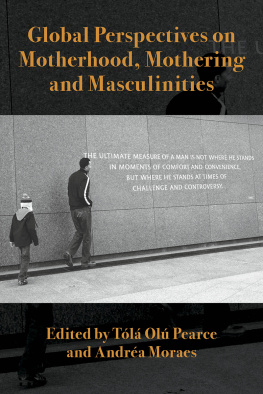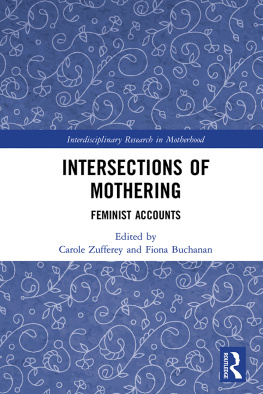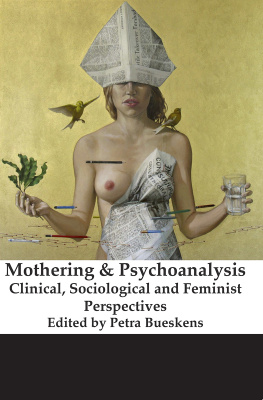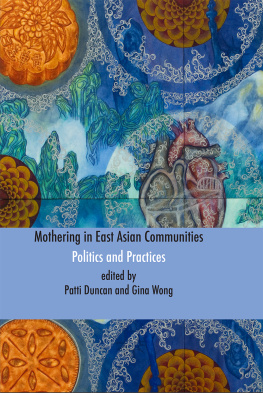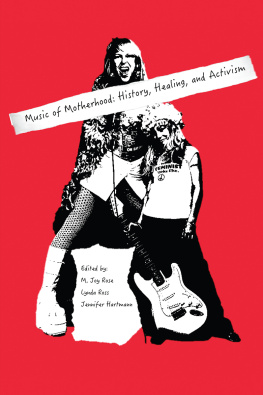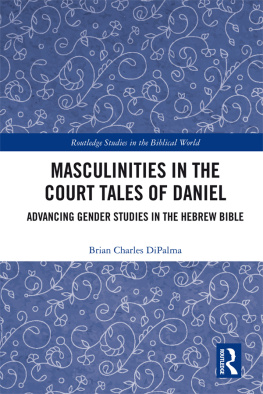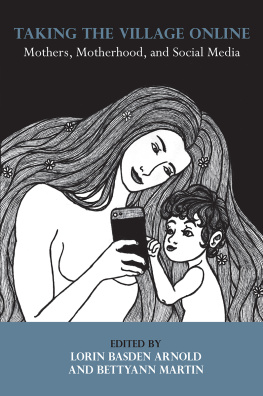Global Perspectives on Motherhood, Mothering and Masculinities
Edited by T l Ol Pearce and Andr a Moraes

Global Perspectives on Motherhood, Mothering, and Masculinities
Edited by Tl Ol Pearce and Andra Moraes
Copyright 2021 Demeter Press
Individual copyright to their work is retained by the authors. All rights reserved. No part of this book may be reproduced or transmitted in any form by any means without permission in writing from the publisher.
Demeter Press
2546 10th Line
Bradford, Ontario
Canada, L3Z 3L3
Tel: 289-383-0134
Email:
Website: www.demeterpress.org
Demeter Press logo based on the sculpture Demeter by Maria-Luise Bodirsky www.keramik-atelier.bodirsky.de
Printed and Bound in Canada
Cover image: Wilma King, Arvarh E. Strickland Professor Emerita, Departments of History and Black Studies. University of Missouri, Columbia.
Cover design and typesetting: Michelle Pirovich
eBook: tikaebooks.com
Library and Archives Canada Cataloguing in Publication
Title: Global perspectives on motherhood, mothering, and masculinities / edited by Tl Ol Pearce and Andra Moraes.
Names: Pearce, Tl Ol, 1944- editor. | Moraes, Andra, 1962- editor.
Description: Includes bibliographical references.
Identifiers: Canadiana 20200375385 | ISBN 9781772582871 (softcover)
Subjects: LCSH: MotherhoodSocial aspects. | LCSH: Sex role. | LCSH: Masculinity. | LCSH: Femininity. | LCSH: Motherhood. | LCSH: Mothers and sons. | LCSH: WomenIdentity. | LCSH: Men Identity.
Classification: LCC HQ759 .G56 2021 | DDC 306.874/3dc23
To the late Olfmi Kjor, founder and chair, Department of Nursing at Il-If, my mentor and friend, for her lifelong academic and community service to mothers in Nigeria.
And to our daughters Forabo and Clarinha because everything we do is with you in our hearts and souls.
Acknowledgments
The idea for this book developed from the Motherhood Initiative for Research and Community Involvement (MIRCI) conference held in Toronto in October 2016. MIRCI has since become the International Association of Maternal Action and Scholarship (IAMAS). The 2016 conference was titled Mothers, Mothering, and Motherhood in Todays World, and it brought together scholars from across the globe to present papers on a variety of topics, including mothers in academia, activism, maternal experiences, mothers and daughters, and healthcare issues. In the session on men and mascu-linities, papers were presented on different aspects of family life. Following this, the idea for the present volume was fielded, and a global call for papers was sent out in which the editors sought to draw attention to the powerful but often subtle linkages between motherhood/mothering and masculinities. In casting the net across the world, the editors of this volume hoped to contribute to the growing interest in the ways these two phenomena develop and change within specific contexts, which both enable and constrain human agency.
The editors encouraged contributions to explore the following, though contributors were not limited to these themes: Co-constructions of motherhood and masculinities; generational conceptions of motherhood/mothering and masculinities; historical perspectives; Indigenous perspectives; intersectional issues and influences; cross-cultural/trans-national examinations; the feminization of employment and masculinities; mothering and masculinities among sex workers; motherhood/mothering and masculinities: the diasporic experience; autoethnographic examinations; religious discourses; the impact of incarceration on motherhood/mothering and masculinities; mothering, food and masculinities; and maternal activism and constructions of masculinities. We received many responses to the invitation from around the world and selected the twelve that appear in this volume. Our hope is that more interest will be sparked on this important dimension of womens lives and the neglected topic of mothers in the political arena.
The editors would like to thank the participants of the 2016 MIRCI conference, whose public presentations and private conversations brought out many ideas, including developing this volume. Special thanks go to Andrea OReilly (founder of MIRCI), Angie Deveau, Tracey Carlyle, and Katie B. Garner for all your encouragement and technical advice. We also extend our thanks to each contributor for the submissions as well as the patience each showed in working through the chapters. Finally, we each would like to thank our colleagues and others who have assisted with suggestions.
Tl Ol Pearce: I would like to thank Stella Bol Williams for our many conversations about her continued involvement with working mothers in agriculture in Nigeria and Jay Gubrium, former chair of sociology, University of Missouri, Columbia, who has reviewed several of my publications in this area. Special thanks to Sheila Walker for her analysis of my ideas and for the invitation to present my research on motherhood at Scripps College. Similarly, I am grateful to yb Fgbl for reading my chapter and making suggestions, and to Modp Fgbl for the many hours of technical advice. My colleague, the historian Wilma King, provided us with the cover design, selected from her great collection of photographs. I thank my brother, Olwaj Jameson Pearce, for his discussions and insights on motherhood and masculinity among the Yorb. Thank you all.
Andra Moraes: I would also like to thank Cecilia Rocha for the opportunity to contribute to the ECOSUN project in Vietnam, and I express my appreciation for the whole ECOSUN team in Canada and Vietnam. I also want to thank Iara Lessa for the inspiring conversations about my chapter. Finally, the greatest gratitude goes always to my partner, Burkard, and daughter, Clarinha, for their constant love and support in all my undertakings.
Contents
PART I
CULTURAL NARRATIVES
PART II
ETHNOGRAPHIC RESEARCH
PART III
POSTCOLONIAL DEVELOPMENTS
More Than a Woman: Exploring Motherhood and Masculinities in Food and Nutrition Security in Northern Vietnam
Andra Moraes
Introduction
Tl Ol Pearce and Andra Moraes
The academic study of motherhood and of masculinities took some time to emerge as independent fields of study within feminism (OReilly) and mens studies (Hearn). Second-wave feminists in the West, particularly in the United States, initially kept the study of motherhood and mothers at an arms length, fearing that this aspect of womens lives served to keep women under control in most societies. Feminists yearned for the independence and freedoms that had been denied to their own mothers and saw motherhood as an albatross. Regarding masculinities, mens studies did not initially develop a critical perspective and were often antifeminist. But following second-wave feminism, attention was given to the impact of patriarchy on women, the study of power, as well as the importance of studying masculinities and not just men.
Both topics came into their own during the last two decades of the twentieth century, and the change was also aided by other develop-ments in academia. The cultural turn in the study of societywhich focused on the way social phenomena are socially constructed rather than rooted in nature or biologybegan critiquing many issues that had been ignored. These critiques strengthened the idea that mother-hood was a societal construction, a set of expectations that are not fixed for all women for all time. Thus, motherhood as a social construct is now understood to differ with changing historical and sociocultural conditions and to be affected by the impact of intersecting subsystems in society (e.g., class, race, sexuality, age, and geographic location). Moreover, scholarship from Non-western societies, particularly among postcolonial writers, brought new voices and perspectives to the study of motherhood. Scholars from Africa, Latin America, and Asia did not have the same aversion to studying this aspect of womens lives. Many were interested in the way expectations and behaviour link women to a wide variety of relationships within society. Motherhood studies, thus, broadened from a more limited focus on the mother-child dyad to the way motherhood, as a status, links the individual to many other individuals, organisations, and social institutions. From the micro to the macro levels of society and beyond, the impact of, and various issues surrounding this social construct must be further uncovered. What are the positive (e.g., high status) and negative (e.g., workload and conflict) dimensions of motherhood in different societies and why is this so?

